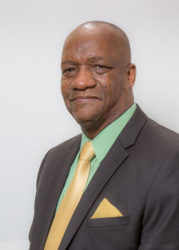Minister of State Joseph Harmon yesterday contradicted reports which first appeared in the state newspaper that government had decided to hold a public referendum on the proposed repeal of laws criminalising buggery.
Asked by Stabroek News at a post-Cabinet press briefing yesterday to explain the rationale behind government’s decision to hold a referendum on the issue, Harmon said government had not made an announcement on the matter.
“The last official position by the government was made clear by His Excellency President David Granger in January of 2017,” he maintained, while reminding that the president had basically said in response to a question on the Public Interest television programme that government respects the right of any individual to engage in practices which are not harmful to others.

Harmon told reporters that the question of a referendum was really not on the cards since the decriminalisation of buggery has not been ventilated at the level of Cabinet, which has made no decision on the matter.
This position is a direct contradiction to several unchallenged articles carried by state and other media.
On April 20th, the Guyana Chronicle published a report, headlined “Referendum to decide legality of homosexuality,” in which it was stated that government, in a letter to the Inter-American Commission on Human Rights (IACHR), announced that “Guyanese will soon have a chance to vote on whether they believe homosexuality should remain a criminal act or if those laws which criminalise it should be struck down via a referendum.”
This report was followed on May 22nd by one headlined “Legalising homosexuality no straightforward matter, says Greenidge,” in which the previous claim was repeated.
Another article published by the Guyana Times on May 21, declared, “Govt to take decriminalising of homosexuality to vote.”
That article quoted Minister of Legal Affairs Basil Williams as saying, “The laws in the Commonwealth Caribbean that criminalise same sex intimacy are remnants of the region’s colonial past… The remnants that have remained, have caused local and international bodies to call for reforms of our laws… The government noted that the Guyanese people are to decide in a referendum whether homosexuality should remain a criminal offence.”
These reports have triggered responses from several sections of civil society, with the Society Against Sexual Orientation Discrimination (SASOD), the Guyana Human Rights Association (GHRA), Red Thread, the Justice Institute Guyana and the civil society network, the Guyana Equality Forum, all condemning resorting to a referendum and calling the reported action a substitute for leadership, courage and decency.
At no point in the last two months have any of the reports been corrected or refuted by government. However, Harmon yesterday called for persons to be clear on issues before they create hysteria.
He maintained that Greenidge, in his submission to the international body, merely presented a referendum as an option and stressed that a referendum is the highest level of consultation. “You can’t get it better than that,” Harmon declared.
Harmon’s clarification of government’s position has been welcomed by Executive Director of SASOD Joel Simpson, who told Stabroek News in an invited comment that SASOD, the Guyana LGBT Coalition and the Guyana Equality Forum are very pleased to hear that the proposal to have a referendum was not a Cabinet decision nor an official government position.
He further explained that these civil society groups do not believe that any citizen of this country should have the legal status of their humanity determined by popular vote. “A referendum on a human rights issue is the antithesis of human rights. Human rights exist to protect minorities from the tyranny of the majority. A referendum on an issue of citizens’ rights is completely unprincipled, backward and cowardly,” Simpson said while calling on Guyana’s elected leaders to lead.
“Guyana is supposed to be a representative democracy. The coalition government is being cowardly in not amending these laws directly, which is what they know they need to do. Not pass their responsibility onto the population,” he stressed.
Simpson reiterated that every person in this country – and LGBT people especially – is entitled to have their rights respected according to international standards, including the major international human rights treaties to which Guyana is a party.
These treaties, he explained, are directly a part of the Guyana constitution through Article 154 and the Fourth Schedule, thus this issue has already been decided by the Guyana constitution and all ordinary legislation needs to conform. “These insidious, colonial-era laws which violate our fundamental rights and freedoms must be repealed without further delay and politicking on the issue,” Simpson stressed.






